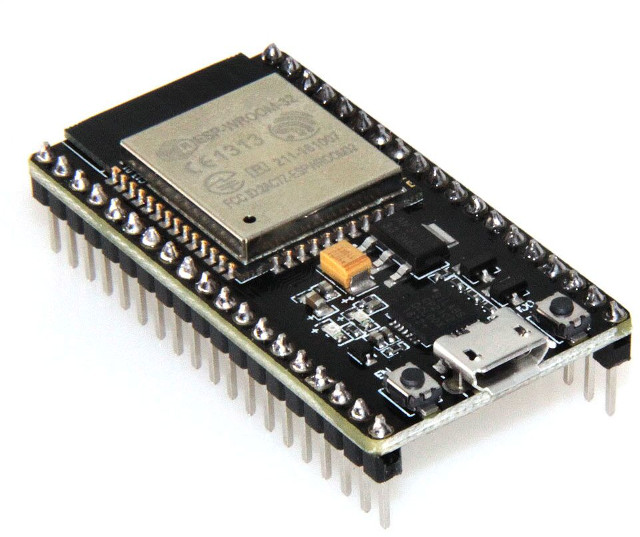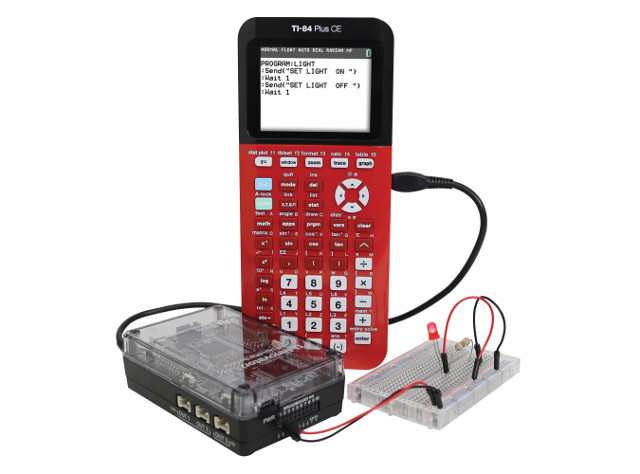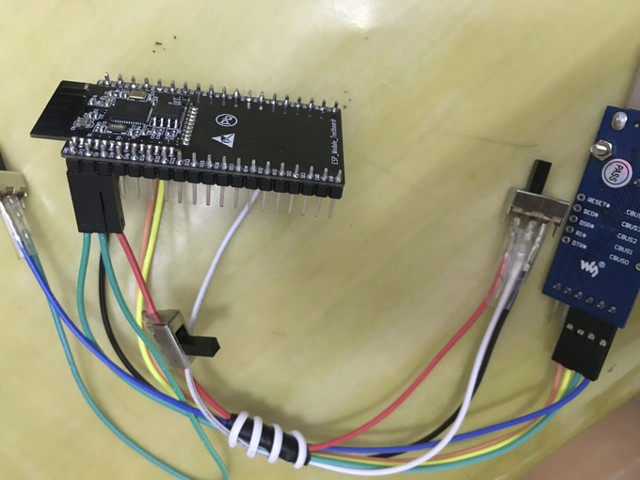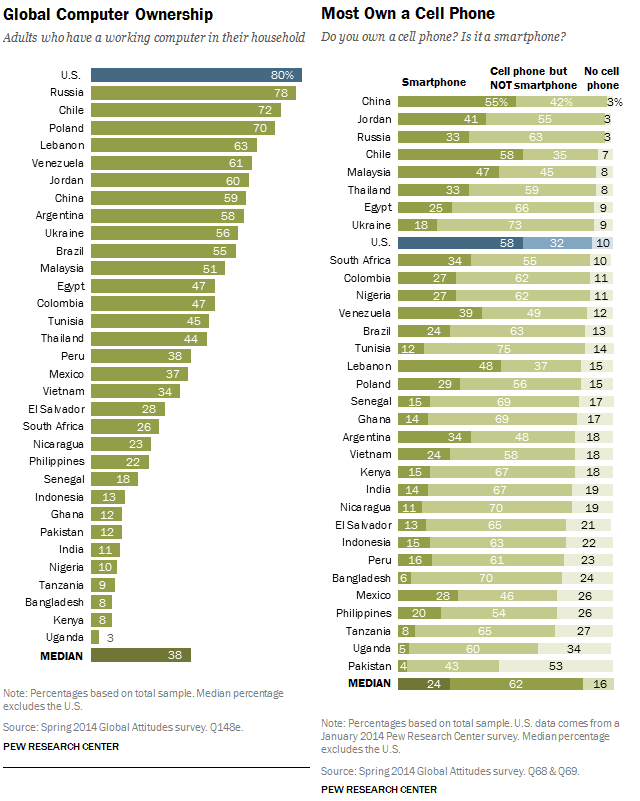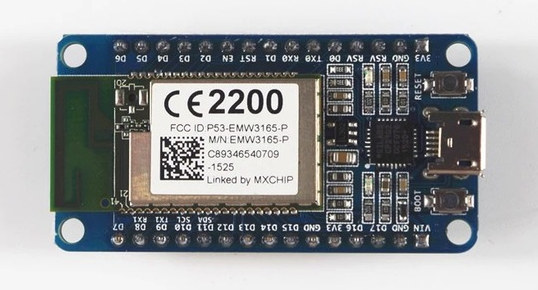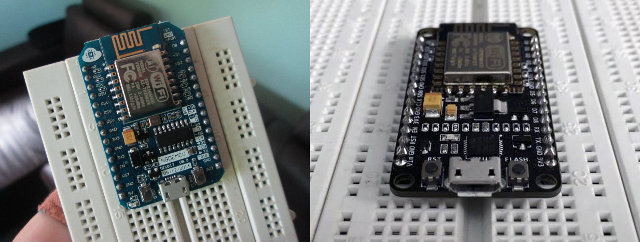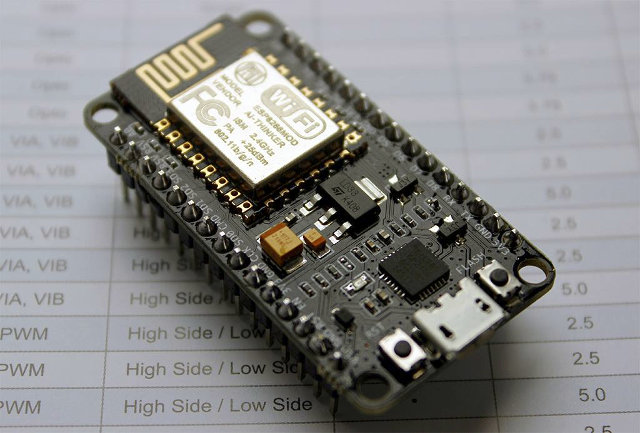ESP32 SoC with WiFi and Bluetooth launched last September for around $3, followed soon after by ESP32 modules for $7, and a few weeks later, easier to use ESP32 development boards were introduced, but sold for around $20 likely due a mismatch between supply and demand. That’s not overly expensive, but in a world of $4 ESP8266 boards and $10 Raspberry Pi Zero W with Linux, WiFi and Bluetooth, it may feel that way. But today, I noticed DealExtreme sold GeekWorm ESP32 board with ESP-WROOM-32 module for just $11.64 shipped. That’s good progress, but surely Aliexpress must now have cheaper options, and sure enough, I could find NodeMCU ESP-32S board (now confirmed NOT to be an official NodeMCU devkit) sold for $6.95 + shipping, which brought the price up to about $8.50. NodeMCU ESP-32S specifications: Wireless Module – ESP-WROOM-32 with Espressig ESP32 dual core processor with 802.11 b/g/n WiFi and […]
TI Innovator Hub Connects MSP432 LaunchPad Board to TI Graphing Calculators
I remember when I was in high school we all had those TI calculators to cheat enhance our chances of passing exams, but Texas Instruments has now launched what it calls TI-Innovator Hub based on a MSP432 LaunchPad board that connects to some of their graphing calculators and allows student to program and control external hardware through their calculators. Innovator Hub hardware specifications: MSP-EXP432P401-ET TI LaunchPad Board 3x input ports, 3x output ports, I²C port Breadboard connector with 20 labeled pins USB Mini USB Port (DATA port for connection to a TI graphing calculator, or a computer running TI-Nspire CX software) Micro-USB port (POWER port to connect to external power source) Misc – Red LED, RGB LED, Light Brightness Sensor, and speaker Enclosure The hub can then be programmed using TI-84 Plus CE (TI Basic language) or TI-Nspire CX (Lua language) graphing calculators. It’s a bit like playing with Arduino […]
Get an Early ESP32 Board by Contributing to Luanode for ESP8266 & ESP32 Project (Crowdfunding)
Development boards and module based on Espressif ESP32 dual core processor with WiFi and Bluetooth LE connectivity are due for Q3 or Q4 2016, but you could get an early sample as early as July if you contribute to Jimmy Wu’s (of wifimcu.com) crowdfunding campaign to develop Luanode (Lua SDK) for ESP8266 and ESP32 processors, as ESP32 boards are part of the rewards. Luanode is a Lua SDK for ESP32 and ESP8266 that supports multi-tasking through FreeRTOS, and includes support for peripherals. The source code and documentation can be already be found on Github, and the main differences against something like NodeMCU appear to be multi-tasking and (for now) ESP32 support. Interestingly the SDK contains a tools called WiFi-Killer uses for Denial of Service (DoS) attacks using ESP8266 or ESP32 modules… One hardware project is called WiFi tank comprised of one T300 Tank Chassis, ESP8266 Development Kit, 720p HD Camera, […]
Programming ESP8266 Boards with a Smartphone
In recent days, I wrote about low cost MCU boards such as the $2 BluePill, and the One Dollar Board project, but several people commented that while the board themselves are very cheap, it might still be a problem in some developing countries, where access to computers cannot be taken for granted. So person suggested that such initiative would work better in some countries if programming was possible via a smartphone instead. Is that true? According to a 2014/2015 study by Pew Research Center, there is some truth to it, but it varies greatly between countries. For example, 55% of Brazilian adults own a computer at home, while only 24% own a smartphone, but in Kenya only 8% own a computer at home, while 15% own a smartphone. Some devices in the “cellphones but not smartphones” might be feature phones with WiFi and a web browser. Anyway ideally a low […]
$10 WiFiMCU Board is a NodeMCU Clone Based on EMW3165 Module
Yesterday I wrote a short tutorial for NodeMCU board, and one visitor mentioned WiFiMCU board that has a similar form factor as NodeMCU, and while it is more expensive at about $10 on Aliexpress or Ebay, it is also more powerful and provides more I/Os thanks to its EMW3165 module including an STM32 Cortex M4 micro-controller with 128KB RAM, 512KB flash, a Broadcom WiFi module, and 2MB SPI flash. WiFiMCU specifications: MCU – STMicro STM32F411CE Cortex-M4 microcontroller @ 100MHz with 128KB RAM, 512KB flash Storage – 2MB SPI flash WiFi – Broadcom 802.11 b/g/n RF Chip: Modes – Station, Soft AP and Station+Soft AP Security – WEP, WPA/WPA2, PSK/Enterprise 16.5dBm@11b, 14.5dBm@11g, 13.5dBm@11n Receiver sensitivity – -87 dBm 2x 15-pin headers with 17x GPIO Pin 3x UARTs 5x ADC, 1x SPI, 1x I2C, 1x USB SWD debug interface 11x PWM Misc – Boot and Reset buttons Power Supply – 5V via […]
Getting Started with NodeMCU Board Powered by ESP8266 WiSoC
Since ESP8266 is now so popular, I’ve recently bought a NodeMCU board to try it. I selected this board because the latest version of the board is breadboard-friendly, integrates a USB to serial chip, and it can be powered by a simple USB to micro USB cable. I also noticed a ESP8266 tutorial with NodeMCU firmware by SwitchDoc Labs the other day (using ESP-12 and Adafruit Huzzah), which I applied to my NodeMCU board, but since I encountered a few issues, I decided to report my findings, and write my own little getting started guide to switch on/off LED and GPIOs using a web interface. NodeMCU v0.9 and NodeMCU v1.0 If you are going to purchase a NodeMCU board it’s important to know there are two official versions: NodeMCU v0.9 with ESP-12 module NodeMCU v1.0 with ESP-12E module The main complain about NodeMCU v0.9 is that while it fits on […]
NodeMCU is both a Breadboard-Friendly ESP8266 Wi-Fi Board and a LUA based Firmware
NodeMCU is a LUA based interactive firmware for Expressif ESP8622 Wi-Fi SoC, as well as an open source hardware board that contrary to the $3 ESP8266 Wi-Fi modules includes a CP2102 TTL to USB chip for programming and debugging, is breadboard-friendly, and can simply be powered via its micro USB port. Let’s checkout the hardware first. The latest version of the board (V1.0) has the following specifications and features: Wi-Fi Module – ESP-12E module similar to ESP-12 module but with 6 extra GPIOs. USB – micro USB port for power, programming and debugging Headers – 2x 2.54mm 15-pin header with access to GPIOs, SPI, UART, ADC, and power pins Misc – Reset and Flash buttons Power – 5V via micro USB port Dimensions – 49 x 24.5 x 13mm The hardware documentation for the board can be found on nodemcu-devkit repo, including schematics and PCB layout designed with Altium Designer, […]


